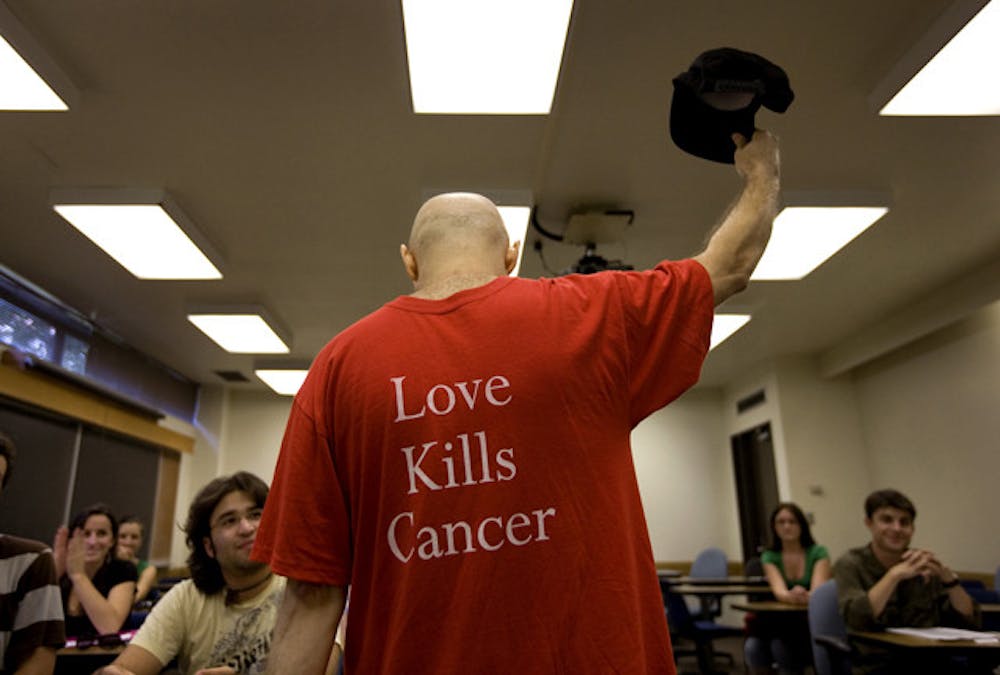At the age of 48, John Kaplan was a Pulitzer-Prize winning photojournalist, a father of two and a journalism professor at UF. At the same age, he became a cancer patient.
"That word, ‘cancer,' can cut through you like a knife," he said.
Shortly after being diagnosed in August 2008 with non-Hodgkin's lymphoma, a potentially deadly blood disease, Kaplan found an outlet for his pain, fears and hopes through his camera lens. Through photos and videos he took of himself, Kaplan documented his battle with cancer. Viewers of Kaplan's feature-length film, "Not As I Pictured," are privy to emotionally charged scenes, from his hair falling out in the shower and his painful bone marrow transplant to his wife's expression when his doctor told him he was in complete remission in 2008.
The documentary is meant to inspire and give people hope, Kaplan said, by showing that many cancers are not the death sentences they once were but rather are treatable, and beatable, illnesses.
According to the Centers for Disease Control and Prevention, the number of cancer survivors in the United States has increased from 3 million in 1971 to 11.7 million in the most recent count.
"That may be the small nugget of courage [cancer patients] need to fight through the process," he said.
Kaplan's uplifting film made its television debut in Gainesville last March. It has won 21 awards, including two CINE Golden Eagle Awards and several awards for Best Documentary. Now, six months later, the film's success continues to grow, as does the number of lives it has touched.
Kaplan has organized 450 broadcasts of the film through PBS affiliates, reaching about 70 million homes.
In an effort to "pay it forward," Kaplan is giving away 10,000 free copies of the DVD and its accompanying guide to coping with cancer for anyone who has been touched by cancer - a disease that affects one in three Americans.
As of Wednesday, Kaplan said he has given away about 4,600 copies to cancer patients, their friends and families, caregivers and medical professionals.
The documentary is also being used as a teaching tool.
After founding partnerships with organizations like the American Cancer Society and the American Society of Clinical Oncology, the film is being shown to medical professionals across the United States to stress the important concept of humanism in medicine - the idea that doctors should treat patients not just as charts and diagnoses but as individuals with feelings, hopes and fears, Kaplan said.
He is also using the film and its campaign as a case study in his Social Media and Social Responsibility course at UF, a class that brings together writers, photographers, marketing and public relations students to create media campaigns to raise public awareness about issues like Type 1 diabetes.
Kaplan said his students and colleagues at UF played some of the largest roles in his healing process.
His doctors told him it was important to continue doing what he loved through his treatment. For Kaplan, that was teaching.
Days after his diagnosis, Kaplan stood in front of his international journalism class on the first day of school and told them that he had cancer. But he was going to beat it, he said, and he would be there every day.
"It was important for me to know that I could be there as a teacher even though my body was on this rough roller coaster ride," he said. "Being a professor here is the best job I've had by far."
As a professor, Kaplan tells his journalism students to stay away from clichés. Cancer stories, he used to say as a Pulitzer Prize judge, are always clichés.
"But when you get cancer, you don't feel like a cliché," he said. "You just want to beat it."
Kaplan said he used to hope and pray every day that he would be able to end his documentary with a cliché happy ending - a shot of him holding his thumb in the air, saying the mantra that got him through cancer: Every day is a blessing. Every day is a gift.
Three years later, thousands of Americans have watched the credits roll after that exact scene, and Kaplan is living happily ever after.
To sign up for a free copy of the DVD, visit NotAsIPictured.org and click on the "Get Film/Shop" link.
On the first day of his international journalism class at the University of Florida, Kaplan tips his cap to his students after explaining he had been diagnosed with cancer. Despite six months of chemo treatments, he never missed a class but was not permitted by his doctors to fly with his “Florida FlyIns” students to Guatemala.






